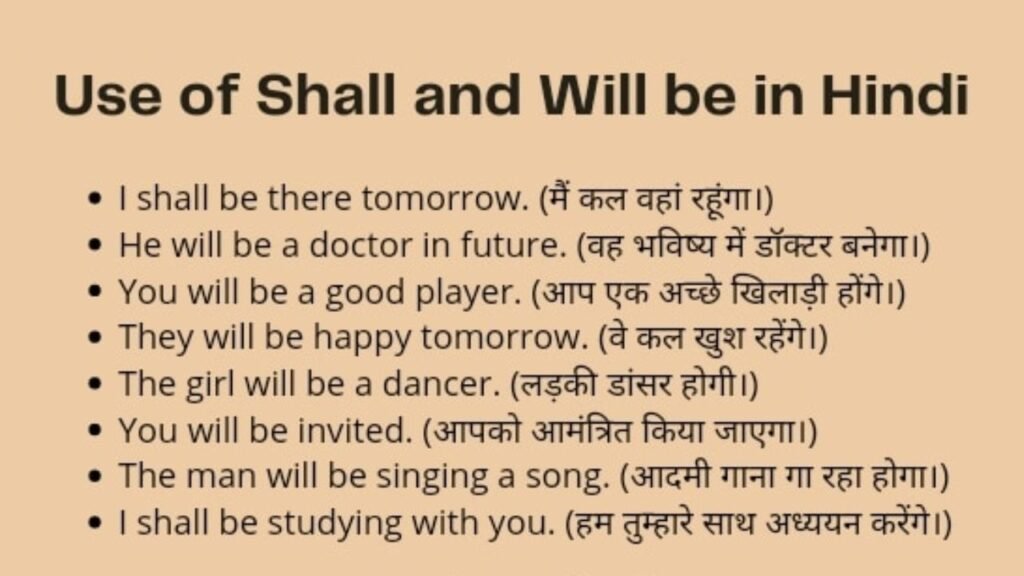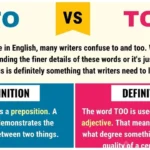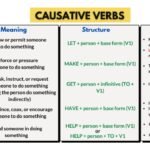Use Of Shall have to and Will have to In Hindi: Prayer Shall is used with any first person subject (I or We) whereas “Will” is used with all other 2nd (second) or 3rd (third) person subjects. (प्राय “Shall” का प्रयोग किसी भी प्रथम पुरुष विषय (मैं या हम) के साथ किया जाता है, जबकि “Will” का प्रयोग अन्य सभी द्वितीय (द्वितीय) या तृतीय (तृतीय) व्यक्ति विषयों के साथ किया जाता है।)
| Subjects | Subjects |
|---|---|
| i – Shall | You – Will |
| He – Will | We– Shall |
| She – Will | They – Will |
| It – Will | Name’s – Will |
| Name – Will | This– Will |
| This – Will | These – Will |
| That – Will | Those – Will |
Rule 1 : To Show a simple futurity. – सरल भविष्य दर्शाना।
Example:
- He will go to the market tomorrow. वह कल बाजार जाएगा।
- She shall finish her homework by evening. वह शाम तक अपना होमवर्क खत्म कर लेगी।
- They will play football in the park. वे पार्क में फुटबॉल खेलेंगे।
- I will visit my grandparents next week. मैं अगले हफ्ते अपने दादा-दादी से मिलने जाऊंगा।
- We shall attend the concert tonight. हम आज रात कंसर्ट में शामिल होंगे।
- You will receive your package soon. तुम्हें जल्द ही अपना पैकेज मिल जाएगा।
- The train will arrive at 10 AM. ट्रेन सुबह 10 बजे पहुंचेगी।
- He shall start his new job on Monday. वह सोमवार से अपनी नई नौकरी शुरू करेगा।
- They will host a party this weekend. वे इस सप्ताहांत एक पार्टी आयोजित करेंगे।
- She will call you later. वह तुम्हें बाद में फोन करेगी।
Rule 2
2. The Repetition of Shall or will is avoid in a Conditional sentence, It is replace by using Present Indefinite Tense with the Past that show condition.(ज्यादातर उपयोग होने वाले वाक्यों में ‘Shall’ या ‘Will’ की ट्रांसलेट से बचा जाता है, इसे शर्त को दर्शाने वाले Past Tense के साथ Present Indefinite Tense का उपयोग करके ट्रांसलेट किया जाता है।)
Note: Note that the part stating the condition starts with if/when/unless/in case.
Example:
- If he goes to the market, he will buy fruits. अगर वह बाजार जाता है, तो वह फल खरीदेगा।
- When she finishes her homework, she will watch TV. जब वह अपना होमवर्क खत्म करती है, तो वह टीवी देखेगी।
- Unless they practice hard, they will not win the match. जब तक वे कड़ी मेहनत से अभ्यास नहीं करते, वे मैच नहीं जीतेंगे।
- In case it rains, we will stay home. अगर बारिश होती है, तो हम घर पर रहेंगे।
- If I see him, I will tell him the news. अगर मैं उसे देखता हूं, तो मैं उसे खबर बताऊंगा।
- When the train arrives, we will leave. जब ट्रेन पहुंचेगी, हम निकलेंगे।
- Unless you study, you will fail the exam. जब तक तुम पढ़ाई नहीं करते, तुम परीक्षा में असफल हो जाओगे।
- If she finds her keys, she will go out. अगर उसे अपनी चाबियाँ मिल जाती हैं, तो वह बाहर जाएगी।
- When he gets his salary, he will buy a car. जब उसे उसकी तनख्वाह मिलती है, तो वह एक कार खरीदेगा।
- Unless it stops raining, we will not go outside. जब तक बारिश नहीं रुकती, हम बाहर नहीं जाएंगे।
Rule 3 : To know One’s Wishes- किसी की इच्छा जानने के लिए
Example:
- Will you help me with this task? क्या तुम मेरी इस काम में मदद करोगे?
- Will she come to the party? क्या वह पार्टी में आएगी?
- Will they join us for dinner? क्या वे हमारे साथ रात के खाने में शामिल होंगे?
- Will he lend me his book? क्या वह मुझे अपनी किताब उधार देगा?
- Will you call me later? क्या तुम मुझे बाद में फोन करोगे?
- Will she finish the project on time? क्या वह समय पर प्रोजेक्ट खत्म करेगी?
- Will they attend the meeting? क्या वे बैठक में शामिल होंगे?
- Will he take care of the dog? क्या वह कुत्ते का ख्याल रखेगा?
- Will you bring the documents? क्या तुम दस्तावेज़ लाओगे?
- Will she help her mother? क्या वह अपनी माँ की मदद करेगी?
Rule 4 : To make a Suggestion + Precaution With Else.-सुझाव देने के लिए + अन्य के साथ सावधानी बरतें।
Example:
- Study hard, else you will fail the exam. कड़ी मेहनत से पढ़ाई करो, वरना तुम परीक्षा में असफल हो जाओगे।
- Be careful, else you will get hurt. सावधान रहो, वरना तुम्हें चोट लग जाएगी।
- Finish your work, else you will miss the deadline. अपना काम खत्म करो, वरना तुम समय सीमा चूक जाओगे।
- Listen to the instructions, else you will make mistakes. निर्देशों को सुनो, वरना तुम गलतियाँ करोगे।
- Save your money, else you will run out of cash. अपने पैसे बचाओ, वरना तुम्हारे पास नकद खत्म हो जाएगा।
- Follow the rules, else you will get fined. नियमों का पालन करो, वरना तुम्हें जुर्माना भरना पड़ेगा।
- Wear a helmet, else you will get injured. हेलमेट पहन लो, वरना तुम्हें चोट लग जाएगी।
- Take an umbrella, else you will get wet. छतरी ले लो, वरना तुम भीग जाओगे।
- Exercise regularly, else you will become unhealthy. नियमित व्यायाम करो, वरना तुम अस्वस्थ हो जाओगे।
- Eat properly, else you will fall sick. ठीक से खाओ, वरना तुम बीमार पड़ जाओगे।
Rule 5 : To Show Possibility- संभावना दर्शाना
Example:
- If he had studied, he would have passed the exam. अगर उसने पढ़ाई की होती, तो वह परीक्षा पास कर लेता।
- She would have come if she had known about the meeting. वह आ जाती अगर उसे बैठक के बारे में पता होता।
- Had they practiced more, they would have won the game. अगर उन्होंने अधिक अभ्यास किया होता, तो वे खेल जीत जाते।
- If it had rained, we would have stayed home. अगर बारिश हुई होती, तो हम घर पर रहते।
- He would have called you if he had your number. उसने तुम्हें फोन कर लिया होता अगर उसके पास तुम्हारा नंबर होता।
- Had she been there, she would have helped us. अगर वह वहाँ होती, तो उसने हमारी मदद की होती।
- If they had prepared well, they would have succeeded. अगर उन्होंने अच्छी तैयारी की होती, तो वे सफल हो जाते।
- She would have finished the project if she had more time. उसने प्रोजेक्ट पूरा कर लिया होता अगर उसके पास अधिक समय होता।
- Had he known the truth, he would have told us. अगर उसे सच पता होता, तो उसने हमें बता दिया होता।
- If we had left earlier, we would have caught the train. अगर हम पहले निकल गए होते, तो हम ट्रेन पकड़ लेते।

Use Of Shall be And Will be (Shall be or Will be का सही प्रयोग कैसे करे?)
Rules and Uses
Rule 1: किसी के गुण को दर्शाने के लिए
Examples :
- He will be a doctor. वह एक डॉक्टर होगा।
- She shall be the leader of the team. वह टीम की नेता होगी।
- They will be happy. वे खुश होंगे।
- I shall be there soon. मैं जल्द ही वहाँ होऊंगा।
- We will be friends forever. हम हमेशा के लिए दोस्त रहेंगे।
- You shall be successful. तुम सफल होगे।
- It will be easy. यह आसान होगा।
- She will be at the park. वह पार्क में होगी।
- He shall be tired after work. वह काम के बाद थका हुआ होगा।
- They will be here by 5 PM. वे शाम 5 बजे तक यहाँ होंगे।
Rule 2: To Show Simple Future State- सरल भविष्य स्थिति दिखाने के लिए
Examples :
- He will be happy to see you. वह तुम्हें देखकर खुश होगा।
- She shall be at the meeting tomorrow. वह कल बैठक में होगी।
- They will be tired after the journey. यात्रा के बाद वे थके होंगे।
- I shall be ready by 8 AM. मैं सुबह 8 बजे तक तैयार हो जाऊंगा।
- We will be there on time. हम समय पर वहां होंगे।
- You shall be informed soon. तुम्हें जल्द ही सूचित किया जाएगा।
- The weather will be pleasant tomorrow. कल मौसम सुहावना होगा।
- He shall be available for the project. वह परियोजना के लिए उपलब्ध होगा।
- They will be delighted with the results. परिणामों से वे प्रसन्न होंगे।
- She will be at home in the evening. वह शाम को घर पर होगी।
Rule 3: To Make a Promise or Assurance- कोई वादा या आश्वासन देना
Examples :
- I shall be with you always. मैं हमेशा तुम्हारे साथ रहूंगा।
- You will be safe with us. तुम हमारे साथ सुरक्षित रहोगे।
- He shall be responsible for this task. वह इस कार्य के लिए जिम्मेदार होगा।
- We will be careful next time. हम अगली बार सावधान रहेंगे।
- She shall be treated with respect. उसके साथ सम्मान से व्यवहार किया जाएगा।
- They will be punctual from now on. वे अब से समय के पाबंद होंगे।
- You shall be rewarded for your efforts. तुम्हें तुम्हारे प्रयासों के लिए पुरस्कृत किया जाएगा।
- He will be the leader of the team. वह टीम का नेता होगा।
- We shall be there to support you. हम तुम्हें समर्थन देने के लिए वहां होंगे।
- She will be fine soon. वह जल्द ही ठीक हो जाएगी।
Rule 4: To Show Inevitable Future- अपरिहार्य भविष्य दिखाने के लिए
Examples :
- The sun will be rising in the east. सूरज पूर्व में उगता रहेगा।
- Winter shall be coming soon. सर्दी जल्द ही आ जाएगी।
- They will be arriving by noon. वे दोपहर तक आ जाएंगे।
- The meeting shall be starting at 10 AM. बैठक सुबह 10 बजे शुरू होगी।
- The store will be closing at 9 PM. स्टोर रात 9 बजे बंद होगा।
- She shall be joining the company next month. वह अगले महीने कंपनी में शामिल होगी।
- He will be moving to a new house. वह एक नए घर में जा रहा होगा।
- We shall be celebrating our anniversary. हम अपनी सालगिरह मना रहे होंगे।
- You will be visiting your relatives soon. तुम जल्द ही अपने रिश्तेदारों से मिलने जा रहे हो।
- The project shall be completed by next week. परियोजना अगले हफ्ते तक पूरी हो जाएगी।
Rule 5: To Express a Scheduled Event- किसी निर्धारित कार्यक्रम को व्यक्त करने के लिए
Examples :
- The train will be departing at 6 PM. ट्रेन शाम 6 बजे रवाना होगी।
- The show shall be starting soon. शो जल्द ही शुरू होगा।
- They will be meeting us at the airport. वे हमें हवाई अड्डे पर मिल रहे होंगे।
- The conference shall be held next Friday. सम्मेलन अगले शुक्रवार को होगा।
- She will be presenting her findings tomorrow. वह कल अपने निष्कर्ष प्रस्तुत करेगी।
- He shall be taking the exam next month. वह अगले महीने परीक्षा दे रहा होगा।
- The bus will be arriving shortly. बस थोड़ी देर में आ रही होगी।
- We shall be leaving for the trip at dawn. हम यात्रा के लिए सुबह रवाना हो रहे होंगे।
- You will be receiving your results next week. तुम्हें अगले हफ्ते अपने परिणाम मिल रहे होंगे।
- The team shall be playing in the finals. टीम फाइनल में खेल रही होगी।
Rule 6: To Indicate Future Obligation or Duty- भावी दायित्व या कर्तव्य को इंगित करने के लिए
Examples :
- He shall be responsible for the team. वह टीम के लिए जिम्मेदार होगा।
- You will be in charge of the project. तुम परियोजना के प्रभारी होंगे।
- They shall be following the new rules. वे नए नियमों का पालन करेंगे।
- She will be leading the discussion. वह चर्चा का नेतृत्व करेगी।
- We shall be taking care of the guests. हम मेहमानों का ख्याल रखेंगे।
- The students will be attending the seminar. छात्र संगोष्ठी में शामिल होंगे।
- He shall be delivering the keynote speech. वह मुख्य भाषण देगा।
- You will be managing the event. तुम कार्यक्रम का प्रबंधन करोगे।
- They shall be ensuring everyone’s safety. वे सभी की सुरक्षा सुनिश्चित करेंगे।
- She will be overseeing the operations. वह संचालन की देखरेख करेगी।
Use of Shall have to and Will have to (हिंदी में Shall have to and Will have to का प्रयोग कहाँ-कहाँ करना चाहिए)
Rules and Uses
Rule 1: कर्ज या मज़बूरी को दर्शाने के लिए|
Examples :
- I shall have to go to the market.
मुझे बाजार जाना पड़ेगा। - He will have to complete his homework.
उसे अपना होमवर्क पूरा करना पड़ेगा। - They will have to leave early.
उन्हें जल्दी जाना पड़ेगा। - She shall have to attend the meeting.
उसे बैठक में शामिल होना पड़ेगा। - We will have to prepare for the exam.
हमें परीक्षा की तैयारी करनी पड़ेगी। - You shall have to finish the project by tomorrow.
तुम्हें कल तक परियोजना समाप्त करनी पड़ेगी। - They will have to follow the rules.
उन्हें नियमों का पालन करना पड़ेगा। - He shall have to apologize.
उसे माफी मांगनी पड़ेगी। - We will have to wait for the results.
हमें परिणामों का इंतजार करना पड़ेगा। - She will have to get a job.
उसे नौकरी करनी पड़ेगी।
Rule 2: भाविश्त्काल के अधिकार को दर्शाने के लिए|
Examples :
- I shall be the owner of this house.
मैं इस घर का मालिक हूँगा। - He will be the leader of the team.
वह टीम का नेता होगा। - She shall be the head of the department.
वह विभाग की प्रमुख होगी। - They will be the representatives.
वे प्रतिनिधि होंगे। - We shall be the winners.
हम विजेता होंगे। - You will be the manager.
तुम प्रबंधक होगे। - I shall be the chief guest.
मैं मुख्य अतिथि हूँगा। - He will be the king.
वह राजा होगा। - They shall be the judges.
वे न्यायाधीश होंगे। - She will be the owner of the car.
वह कार की मालिक होगी।
Rule 3: मज़बूरी को दर्शाने के लिए|
Examples :
- I shall have to have patience.
मुझे धैर्य रखना होगा। - He will have to have courage.
उसे साहस रखना होगा। - She shall have to have trust in him.
उसे उस पर विश्वास रखना होगा। - They will have to have proper documents.
उन्हें सही दस्तावेज रखने होंगे। - We shall have to have a plan.
हमें एक योजना बनानी होगी। - You will have to have a valid ID.
तुम्हें मान्य पहचान पत्र रखना होगा। - I shall have to have good marks.
मुझे अच्छे अंक प्राप्त करने होंगे। - He will have to have a backup plan.
उसे एक बैकअप योजना रखनी होगी। - They shall have to have resources.
उन्हें संसाधन रखने होंगे। - She will have to have permission.
उसे अनुमति प्राप्त करनी होगी।

Affirmative Sentences
Examples with Detailed Explanations
Affirmative:
I shall have to study hard.
मुझे कड़ी मेहनत करनी पड़ेगी।
Explanation: This sentence expresses a future obligation for “I” to study hard.
He will have to attend the meeting.- यह वाक्य “मैं” के लिए कठिन अध्ययन करने के भविष्य के दायित्व को व्यक्त करता है। उसे बैठक में उपस्थित होना होगा।
उसे बैठक में शामिल होना पड़ेगा।
Explanation: This sentence shows a future requirement for “he” to attend the meeting.
Examples :
- I shall have to study hard.
- मुझे कड़ी मेहनत करनी पड़ेगी।
- He will have to attend the meeting.
- उसे बैठक में शामिल होना पड़ेगा।
- She shall have to prepare dinner.
- उसे रात का खाना बनाना पड़ेगा।
- They will have to submit the report.
- उन्हें रिपोर्ट जमा करनी पड़ेगी।
- We shall have to leave early.
- हमें जल्दी जाना पड़ेगा।
Negative Sentences
Examples with Detailed Explanations Of negative Sentence
I shall not have to go to the office tomorrow.
मुझे कल ऑफिस नहीं जाना पड़ेगा।
Explanation: This sentence indicates that “I” will not have the obligation to go to the office tomorrow.- (यह वाक्य यह दर्शाता है कि “मुझे” कल कार्यालय जाने की बाध्यता नहीं होगी।)
He will not have to pay the fine.
उसे जुर्माना नहीं देना पड़ेगा।
Explanation: This sentence shows that “he” will not be required to pay the fine.
Interrogative:
- I shall not have to go to the office tomorrow.
मुझे कल ऑफिस नहीं जाना पड़ेगा।
He will not have to pay the fine.
उसे जुर्माना नहीं देना पड़ेगा।
She shall not have to cook tonight.
उसे आज रात खाना नहीं बनाना पड़ेगा।
They will not have to attend the class.
उन्हें कक्षा में शामिल नहीं होना पड़ेगा।
We shall not have to work on weekends.
हमें सप्ताहांत पर काम नहीं करना पड़ेगा।
Interrogative Sentence
Examples with Detailed Explanations Of Interrogative sentence
Shall I have to wait here?
क्या मुझे यहाँ इंतजार करना पड़ेगा?
Explanation: This question asks if “I” will have the obligation to wait here.
Will he have to apologize?- (यह प्रश्न पूछता है कि क्या “मुझे” यहाँ प्रतीक्षा करने का दायित्व होगा। क्या उसे माफ़ी मांगनी होगी?)
क्या उसे माफी मांगनी पड़ेगी?
Explanation: This question inquires if “he” will be required to apologize.
Examples:
- Shall I have to wait here?
- क्या मुझे यहाँ इंतजार करना पड़ेगा?
- Will he have to apologize?
- क्या उसे माफी मांगनी पड़ेगी?
- Shall she have to finish the assignment?
- क्या उसे असाइनमेंट पूरा करना पड़ेगा?
- Will they have to travel tomorrow?
- क्या उन्हें कल यात्रा करनी पड़ेगी?
- Shall we have to move to a new place?
- क्या हमें नई जगह जाना पड़ेगा?
Read Also:






